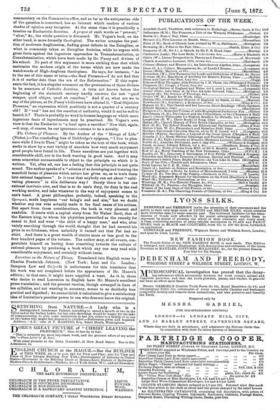The Culture of Pleasure. By the Author of the "Mirage
of Life." (Nisbet.)—The concluding line of Doddridge's epigram, "I live to plea- sure while I live to Thee," might be taken as the text of this book, which seeks to show by a vast variety of anecdote how very much enjoyment good people have found in life. These anecdotes are pat together with considerable skill, nor is the book wanting in good taste. And it may seem somewhat unreasonable to object to the principle on which it is written. Yet, after all, one has a feeling that this principle is not quite sound. The author speaks of a " science of so developing and training the manifold forms of pleasure which nature has given us, as to train them into rational happiness." Is it true that anybody can set about "culti- vating pleasure" in this deliberate way ? Surely there is but one rational institutio vitt; and that is to do one's duty, for duty is the real working motive, and take whatever in the way of enjoyment comes to one's hand. A great philosopher, probably, indeed, speaking to the II•pripixii, made happiness "our being's end and aim," but we doubt whether any one ever actually made it the final cause of his actions. But apart from these considerations, the book is very pleasant and readable. It starts with a capital story from Sir Walter Scott, that of the Eastern king, to whom his physician prescribed as the remedy for ennui to find and wear "the shirt of a happy man," and who, after vainly searching through the world, thought that he had secured his prize in an Irishman, when unluckily it turned out that Pat had no shirt. And there is a great wealth of stories more or less good in the four hundred pages of the volume. The author may, at all events, con- gratulate himself on having done something towards the culture of rational pleasure by producing a book which any one may read with considerable enjoyment, and certainly without harm.


































 Previous page
Previous page